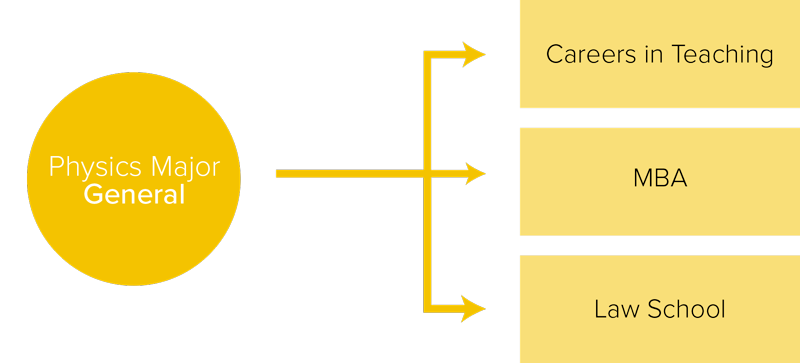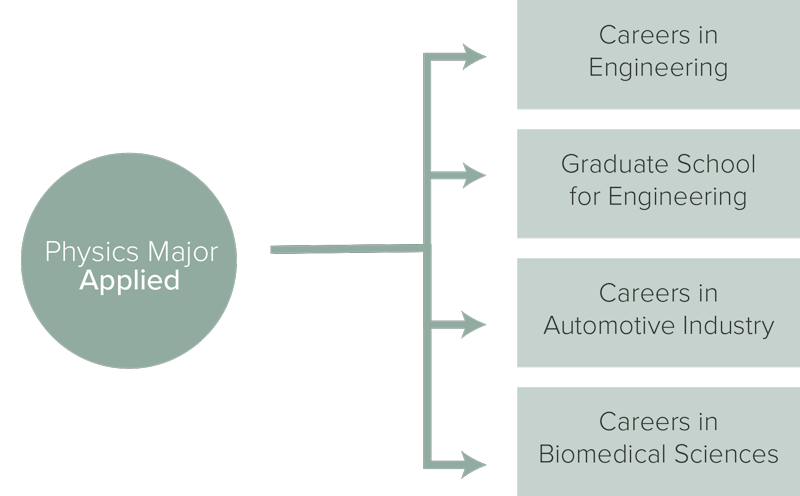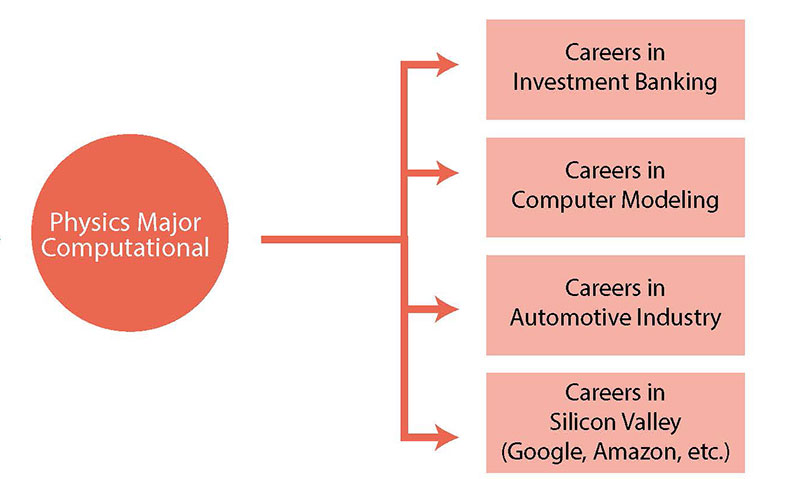The Physics Major

UAB’s B.S. degree in physics is designed to prepare students for research in private sector and national labs, high-tech STEM careers, professional degree and graduate degree programs, and teaching careers.
As a recognition of the success of our major, the department won American Physical Society’s (APS) 2023 Improving Undergraduate Physics Education Award. Our program was chosen as a role model for liberal arts colleges for improving the educational experiences of undergraduate students. This national award recognizes our continuing success of recruiting a high number of physics majors, the research opportunities provided by our faculty, and our numerous major tracks that prepare students for a wide range of career paths.
The department offers a flexible experience for students, allowing them to choose courses geared to their specific interests.
For students interested in preparation for advanced graduate degrees in physics or mathematics, careers in industry, jobs requiring computational expertise, or pursuits in biomedical fields, the department offers focused concentrations (tracks) in their area of choice:
-
Physics Major - General
Through the Major in Physics (our "General Physics Track"), the department strives to fill a critical need for science teachers in Alabama and nationwide. Students interested in promoting STEM literacy and leading a new generation of physics students through a career in teaching are a great fit for this track. They will find a community of physics and science teachers in training through our partnership with UABTeach and UAB’s STEM Education Center. In addition, this track is suitable for students considering a career in business or law, including an MBA or patent law.

-
Physics Major - Advanced
The Advanced Track prepares students for graduate studies in physics or related fields, such as engineering. The curriculum includes a sequence of conceptually challenging courses that build on the basics of core themes.
The courses studied in this track help students develop quantitative and analytic problem-solving skills that enable them to adapt to the changing career landscape and find employment in new and emerging fields. Available electives range from theoretical topics such as differential geometry and tensor calculus to those with more experimental applications like spectroscopy and laser technologies.
Departmental research opportunities train advanced physics students to target problems that blur the boundaries between physics and engineering, photonics, biomedicine, and materials sciences. This experience goes beyond the classroom to prepare them for a physics research career in today’s interdisciplinary research environment.

-
Physics Major - Applied
The Applied Track is primarily designed for those who want to develop the problem-solving skills to pursue careers in applied physics or engineering. This track is ideal for those interested in solving the many technological problems that exist in today’s world. While engineering focuses on well-defined techniques and applied physics generally concentrates on the development of new technologies, both sectors use practical scientific applications to benefit society.
The applied track builds on the foundations of the basic curriculum and explores the use of physics in industry and other technological enterprises. Students interested in pursuing revolutionary breakthroughs in topics like fiber optics and nanotechnology are best suited for this track. Students interested in careers in engineering, the automotive industry, biomedical sciences, or graduate school in engineering.
Much of the research in this field has resulted in new and improved technology, including applications in medicine, engineering, photonics, energy, and defense.

-
Physics Major - Computational
Students who select the Computational Track will develop expertise in the areas of simulation of physical processes, data and experimental analysis, and mathematical reasoning. These valuable skills are essential components of modern research in particle physics, condensed-matter physics, astrophysics, fluid mechanics, quantum field theory, quantum chromodynamics, and plasma physics.
This curriculum not only focuses on advanced topics in physics, but also its relationship with computer science and mathematics. The use of algorithms and simulations to solve complex problems will prepare students for careers related to computer applications, such as computer modeling, investment banking, or the automotive industry.
This track aims to prepare students for new opportunities offered by developments in data sciences and exascale computing and is best suited for those hoping to pursue jobs in banking and finance, information science, and big data. Opportunities at large tech companies are rapidly expanding for students pursuing a concentration in computational physics.

-
Physics Major - Biophysics
The Biophysics track offers a balanced mix of physics, chemistry, biology, and math courses and prepares students for careers in biology and medicine. The curriculum explores the ideas, instrumentation, and computational models of physics to understand living things and biological problems.
Research in this field ranges from the study of bodily systems to that of individual molecules and often has an enormous impact on medical technology. Methods like fluorescent imaging, electron microscopy, x-ray crystallography, and spectroscopy are utilized in the field of biophysics in order to answer questions that affect the daily lives of individuals.
While many students planning to attend medical school pursue their bachelor’s degrees in biology and chemistry, the average physics major scores much higher on the MCAT exam than students from either of these programs. The problem-solving skills and complex understanding of science and technology learned in the biophysics track is ideal for those seeking entrance into top medical schools.
However, the study of biophysics and its applications extend far beyond hospitals and doctor’s offices. Students interested in pursuing careers in cell biology, public health, pharmaceutical R&D, and many others will also find success after graduating from this program.

Learn more about job opportunities for Physics graduates
Honors Program
The Physics Honors Program offers students from all five tracks enhanced opportunities to develop the research, problem-solving and communication skills necessary to excel in a scientific career. By designing, describing, and defending a research project, the honors graduate will have a documented capacity for success in graduate school or in any career where scientific critical thinking, motivation, and accomplishment are valued.
The goal of the Physics Honors Program is to train capable undergraduates for uncommon accomplishment in academic research. The new physics honors graduate will have documented experience and productivity commonly found in second- or third-year graduate students. Ideally, the research project will result in publication and presentation at a national conference, giving the honors graduate strong credentials for graduate or medical/professional school, industrial research, science writing, or teaching. Contacts made through publication and conferences and informed references written by mentor and committee members give the honors graduate a significant edge in the job market. The successful honors student will be recognized at the UAB Honors Convocation and will graduate “With Honors in Physics.”
For additional information on the program, read the Eligibility & Requirements page in the Undergraduate Catalog or contact the Undergraduate Physics Program Director, Dr. Renato P. Camata.
Course Catalog
A complete list of program requirements, courses, and a proposed four-year program of study for physics majors are available in the UAB Undergraduate Catalog.